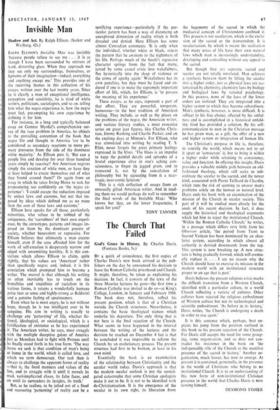The Church That Failed
By a quirk of coincidence, the first copies of Charles Davis's new book arrived at the pub- lishers on the day he announced his decision to leave the Roman Catholic priesthood and Church. It might, therefore, be taken as explaining his decision. In fact, it consists of the texts of the three Maurice lectures he gave—the first time a Roman Catholic was invited to do so—at King's College, London, in January and February 1966. The book does not, therefore, reflect his present position, which is that of a Christian outside the Church structures. Nevertheless, it contains the basic theological stances which underlie his departure. The only thing that is not here is the final rejection of the Church. What seems to have happened in the interval between the writing of the lectures and the decision he reached on December 4 last is that he concluded it was impossible to reform the Church by an evolutionary process. The present structure had first to be broken, at least in his own mind.
Essentially the book is an examination of the relationship between Christianity and the secular world today. Davis's approach is that the modern secular outlook is not the unmiti- gated catastrophe that some Christian apologists make it out to be. It is not to be identified with de-Christianisation. It is the emergence of the secular in its own right, its liberation from the hegemony of the sacred in which the mediaeval concept of Christendom confined it. This process is not secularism, which is the exclu- sion of the sacred or the transcendent. It is secularisation, by which is meant the realisation that many areas of life have their own natural laws which man is increasingly understanding, developing and controlling without any appeal to the sacred.
But though they are separate, sacred and secular are not totally unrelated. Man achieves a synthesis between them by lifting the secular into a higher order, just as physical laws are sys- tematised by chemistry, chemistry laws by biology and biological laws by rational psychology. In this process, none of the laws of the lower orders are violated. They are integrated into a higher system to which they become subordinate. Man's synthesis, however, is more difficult. It is subject to his free choice, affected by his sinful- ness and is accomplished in a historical unfold- ing. God has provided a solution. By his self- communication to men in the Christian message he has given man, as a gift, the offer of a new and higher system or integration of human life.
The Christian's purpose in life is, therefore,
to sanctify the world, which means not to set it apart or `consecrate' it, but to bring it within a higher order while retaining its consistency, value and function. In offering this insight, Davis provides a valuable middle path between an old- fashioned theology, which still seeks to sub- ordinate the secular to the sacred, and the newer kind, associated with Pierre Teilhard de Chardin, which runs the risk of seeming to answer man's problems solely on the human or natural leveL Davis ends his book with an examination of the mission of the Church in secular society. This part of it will be studied most closely for the seeds of his recent decision. In fact, it does supply the historical and theological arguments which led him to reject the institutional Church. 'Within the Roman Catholic Church,' he writes, in a passage which differs very little from his Observer article, 'the period from Trent to Second Vatican has been dominated by an abso- lutist system, according to which almost all authority is derived downwards from the top. This system is now breaking up. A new struc- ture is being gradually formed, which will eventu- ally replace it. . . . I see no reason why the Church should have to exercise its mission in the modern world with an institutional structure proper to an age that is past.'
Davis believes the present religious crisis marks the difficult transition from a Western Church, identified with a particular culture, to a world Church reflecting a variety of cultures. Other cultures have rejected the religious embodiment of Western culture but not its technological and scientific embodiment. 'As before in its history; Davis writes, 'the Church is undergoing a death in order to rise again.'
It is this sentence which, perhaps, best ex- plains his jump from the position outlined in this book to his present rejection of the Church. For Davis still accepts the need for some group- ing, some organisation, and so does not con- tradict his insistence in the book on 'the indispensable role of the Church as the manifest presence of the sacred in history.' Another or- ganisation, much looser, has now to emerge. At present it is contained, germinally, in the presence in the world of Christians who belong to no institutional Church. It is to an understanding of this new form of non-institutional Christian presence in the world that Charles Davis is now turning himself.
DESMOND FISHER






























 Previous page
Previous page